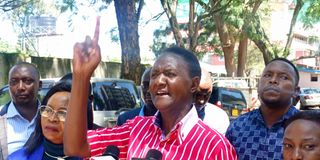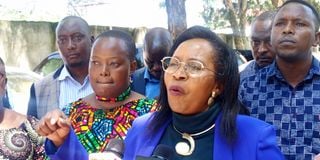Will DCP shake off 'Mt Kenya' title to win hearts in Nakuru?

Simon Nasieku, Secretary General of the DCP party, Nakuru Chapter speaks to the media on May 21,2025.
The launch of a new political outfit by former Deputy President Rigathi Gachagua has escalated political tensions in the country. With, the Democracy for Citizens Party (DCP), the political landscape is heating up—and fast.
Last week, the DCP officially launched its Nakuru chapter, signalling serious political intentions. Nakuru, often dubbed the political capital of Kenya, is a strategic battleground, and the party’s presence here has certainly stirred conversation.
The big question, however, remains: how does the DCP plan to win over Nakuru County?
During an interview with Assumpta Wangui, a member of DCP, she emphasized that the party emerged at a time when public confidence in the United Democratic Alliance (UDA) is waning.

Assumpta Wangui, member of DCP Nakuru chapter speaking to the media on May 21,2025.
“We are a party that was born when the county— which overwhelmingly voted for the ruling party—has already lost faith in UDA. DCP is a symbol of hope and a fresh start for people who feel politically abandoned. Nakuru has many residents looking for new beginnings, and we believe they’ll find that in us,” she shares.
She also dismissess claims that DCP is a tribal outfit, calling those accusations baseless and misleading.
Simon Nasieku, Secretary General of the DCP party, Nakuru Chapter echoes her sentiments. He points to the party’s inclusive leadership as evidence that DCP transcends ethnic lines.
“Our party leader is Rigathi Gachagua, yes, but if you look at the party’s entire leadership structure, you’ll see representation from across the country. If this were truly a ‘Mt. Kenya party,’ as some claim, we wouldn’t have this level of diversity,” he explains.
Still, not everyone is convinced.
Tom Evali, a Nakuru resident, offered a different perspective. He believes DCP’s arrival in Nakuru was a calculated move.
“In the bigger picture, Nakuru is often seen as an extension of Mt. Kenya region. So, while the party claims it’s not tribal, many people still associate it with Gachagua—an influential figure in Mt. Kenya politics. That makes any move he makes seem like a strategic bid to strengthen his base,” Evali observes.
Masese Kemunche, CEO of the Centre for Enhancing Democracy Good Governance (CEDGG), addresses the tribal label, noting that a political party should be evaluated by its character and compliance with the Political Parties Act.
“Start by examining the party's leadership—does it reflect Kenya’s ethnic diversity? Then look into the motives of those branding it tribal. Are they genuinely concerned or just pushing political agendas?” he questions.
Mr Kemunche went on to argue that many political parties in Kenya fall short of the standards set by law. He says most are built around individuals rather than ideology.
“When you hear ODM, you think of Raila Odinga. With UDA, it’s the President. The same now applies to DCP. Ideally, we should move towards parties that aren’t tied to personalities but instead stand for clear values and national interests,” he adds.
“As things stand at the moment political parties are owned by individuals and organized around communities and there are no strong ideologies that speak about the greater good of our county” he concludes.
